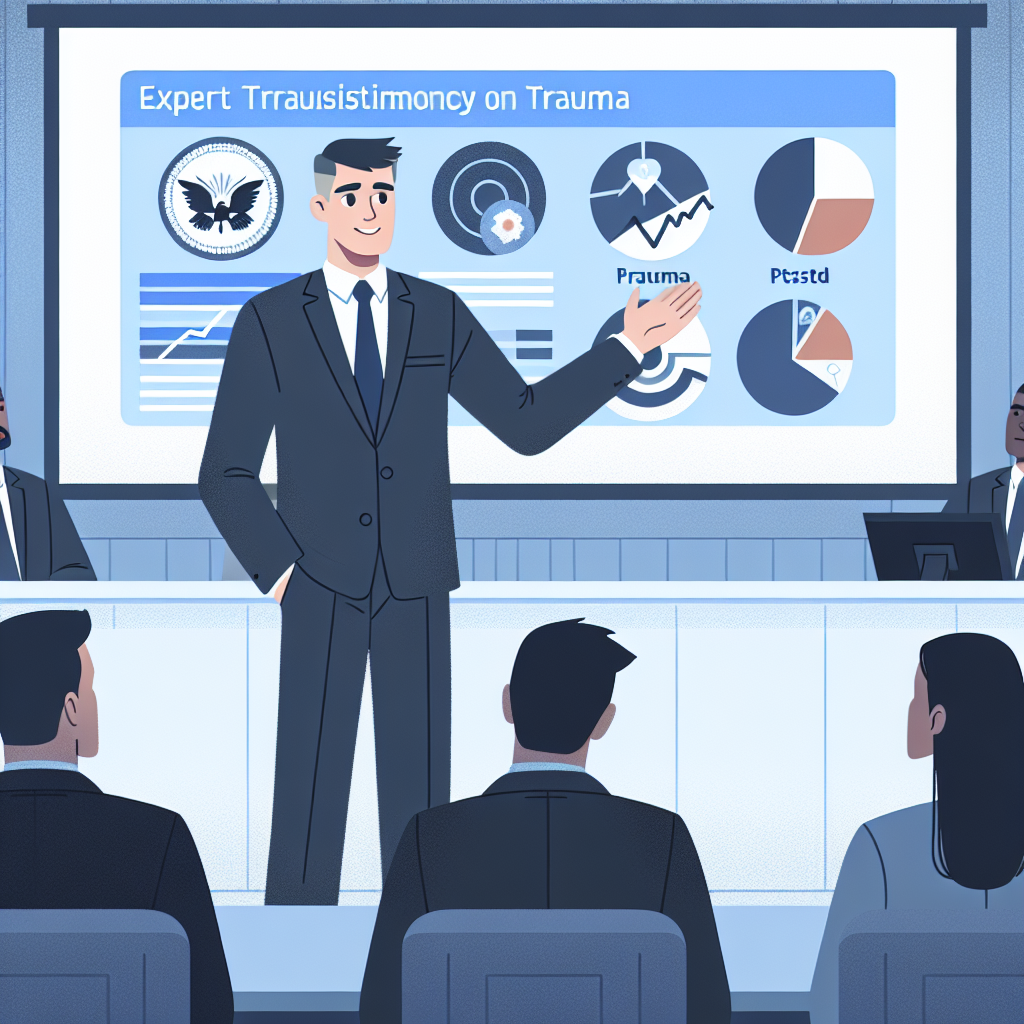
Introduction
In a world where trauma can echo through the lives of individuals long after the events have passed, the role of mental health professionals in understanding and evaluating post-traumatic stress disorder (PTSD) has never been more crucial. Expert testimony on trauma has emerged as a foundation for both legal and clinical practices, providing insight that can shape the outcomes of cases involving individuals who suffer from PTSD. The convergence of psychological expertise and legal processes has proven essential in ensuring justice and healing for trauma survivors.
Having expert witnesses who are well-versed in trauma psychology can not only illuminate the complexities of PTSD but also influence the perception of its effects in legal settings. This article delves into the depths of how mental health professionals contribute to cases involving PTSD, drawing on studies, expert opinions, and real-world applications to provide a comprehensive understanding.
Understanding PTSD and Its Impacts
What is PTSD?
Post-Traumatic Stress Disorder is a mental health condition triggered by experiencing or witnessing a traumatic event. Symptoms can include flashbacks, severe anxiety, nightmares, and uncontrollable thoughts about the event. Understanding the nuances of PTSD is critical, as it often affects a person’s ability to function in daily life, making the role of mental health professionals invaluable.
The Link Between Trauma and PTSD
Research shows that not everyone who experiences trauma develops PTSD. It depends on various factors, including:
- Individual Resilience: Some people possess innate coping mechanisms.
- Support Systems: Strong familial and social networks can mitigate PTSD symptoms.
- Previous Experiences: A history of trauma generally increases vulnerability.
Understanding these factors is crucial for mental health professionals who provide expert testimony on trauma, as it helps them assess each case’s specifics accurately.
The Role of Mental Health Professionals
Experts in Trauma Psychology
Mental health professionals specializing in trauma psychology, such as psychologists, psychiatrists, and clinical social workers, are often called upon to provide expert testimony on trauma cases. Their role involves explaining complex psychological concepts in understandable terms for judges and juries, making their insights vital for justice in PTSD cases.
Assessing PTSD: Methods and Techniques
The assessment of PTSD usually involves:
- Clinical Interviews: Gathering comprehensive personal histories.
- Standardized Assessments: Utilizing tools like the Clinician-Administered PTSD Scale (CAPS) to evaluate symptoms.
Below is a simple table summarizing the assessment methods:
| Method | Description | Purpose |
|---|---|---|
| Clinical Interviews | Direct conversations with patients | Understand personal experiences |
| Standardized Assessments | Objective measures (e.g., CAPS) | Quantify severity of symptoms |
Each method helps in developing a more nuanced understanding of the individual’s trauma and its aftermath, providing the groundwork for expert testimony.
The Legal Context: How Expert Testimony Impacts PTSD Cases
Expert Testimony in Court
When mental health professionals provide expert testimony on trauma in court, they help:
- Clarify the Effects of Trauma: Explaining how traumatic experiences can alter an individual’s functioning.
- Support Claims: Providing evidence to support the claims of PTSD made by claimants in various legal settings, such as workers’ compensation and personal injury cases.
Case Study: The Impact of Expert Testimony
Consider the case of a firefighter who developed PTSD after a traumatic rescue operation. The testimony of a trauma psychologist was pivotal in illustrating how the traumatic incident impacted his daily life, job performance, and mental health. The psychologist utilized standardized assessments and personal interviews, which made a compelling case for the firefighter’s situation.
Analysis: This case highlights the importance of expert testimony in shedding light on the psychological ramifications of trauma, thereby influencing a favorable legal outcome for the firefighter.
Relevance of Expert Testimony on Trauma
Mitigating Misunderstandings
Mental health professionals play a critical role in educating the court about common misconceptions regarding PTSD. For instance, jurors may possess biases stemming from a lack of understanding of trauma responses, leading to potentially unjust conclusions.
Shaping Legal Precedents
Expert testimony not only aids individual cases but can also influence legal standards and precedents concerning the treatment and acknowledgment of PTSD claims.
Case Study: Legal Precedents
In a notable legal case involving military veterans, expert testimony highlighted the psychological impacts of combat. The court’s decision to recognize PTSD as a compensable condition was largely influenced by the testimony of mental health professionals, leading to significant changes in how similar cases are adjudicated nationwide.
Analysis: This demonstrates how expert testimony can set critical legal benchmarks that protect the rights of individuals suffering from PTSD, affirming the essential role of mental health professionals.
Navigating Challenges: The Future of Expert Testimony in PTSD Cases
Challenges Faced by Mental Health Professionals
While the role of mental health professionals in providing expert testimony is critical, they face several challenges, including:
- Complexity of PTSD: The subjective nature of trauma responses makes it difficult to present clear-cut evidence.
- Cultural and Contextual Factors: Different backgrounds may influence how individuals process trauma, complicating testimony.
Future Directions
As an increasing number of individuals seek legal redress for trauma-related conditions, there’s a growing need for:
- Training Programs: Developing specific training for mental health professionals on providing expert testimony.
- Better Collaboration: Enhancing partnerships between legal and psychological fields can improve outcomes.
- Increased Research: Funding research on PTSD can bolster the validity of expert testimony.
Conclusion
Understanding the intricacies of PTSD and the pivotal role mental health professionals play in legal settings is more important than ever. Expert testimony on trauma is not merely an added component of a legal case; it is essential in providing clarity, understanding, and justice for those affected by trauma.
As we navigate an ever-changing landscape of mental health awareness and legal practices, we must continue to value and support the powerful contributions of mental health professionals. Those seeking justice and healing deserve expert voices to advocate for their experiences and needs.
FAQs
1. What qualifications should a mental health professional have to provide expert testimony on trauma?
A mental health professional should generally hold advanced degrees in psychology or psychiatry, specialize in trauma, and have relevant experience in assessing and treating PTSD.
2. How do courts determine the admissibility of expert testimony on trauma?
Courts consider factors such as the expert’s qualifications, the relevance of the testimony to the case at hand, and whether the methods used are generally accepted within the relevant scientific community.
3. Can expert testimony impact the outcome of a case involving PTSD claims?
Yes, expert testimony can dramatically influence jurors’ perceptions and lead to more informed decisions that can affect case outcomes.
4. Are there any biases that jurors may have regarding PTSD?
Yes, jurors may have biases stemming from misconceptions about PTSD, which is why clear expert testimony is crucial for educating the court.
5. What are common assessment tools used by mental health professionals for PTSD?
Some common tools include the Clinician-Administered PTSD Scale (CAPS), the PTSD Checklist (PCL), and structured clinical interviews, which help in accurate diagnosis and assessment.
This comprehensive exploration of Expert Testimony on Trauma: The Role of Mental Health Professionals in PTSD Cases has aimed to shine a light on the critical intersections of psychology and law. With increased understanding and collaboration, we can continue to foster a more informed approach to trauma and its varied impacts on individuals.















